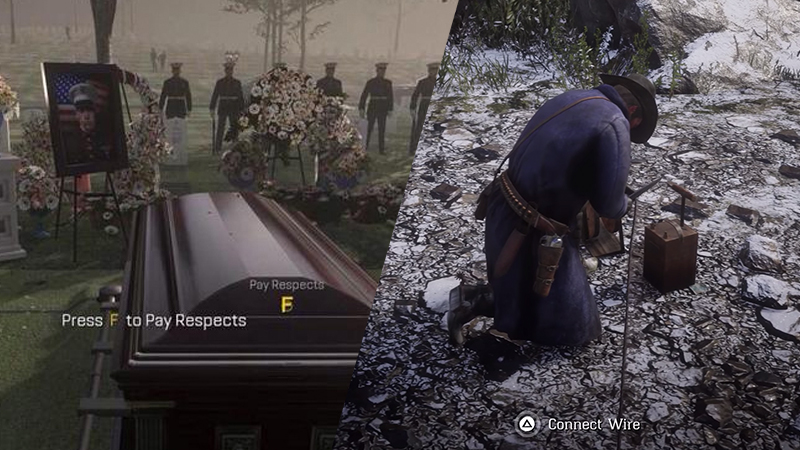Of the three games shown above, I only played two to completion—”completion,” here, being defined as “the end of the main storyline.” It’s not that I didn’t enjoy the storyline of one of these games—quite the contrary! I think all three contain expert levels of narrative storytelling. The reason I didn’t finish one of these games is because one of them was completely exhausting to play for me. I understand that the point of open-world video games is that you’re supposed to feel immersed in the universe of the game, and that exploration apart from the main story is part of the appeal to these types of games. Trust me, I love games that don’t force you down a linear hallway of story (not that there’s anything wrong with that, either). I appreciate the ability to explore the passion of devoted game developers who have lovingly carved out a secondary life for us in which to indulge. However, I think one of these games tries to be too immersive, which, for me, has the ironic effect of removing me from the immersion of the game.
Are you ready for it? It’s Red Dead Redemption 2.
Before you get your keyboard pitchforks out, let me explain what I mean by “too immersive,” because I realize that’s a fairly nebulous descriptor to use. I think RDR2 has a chronic problem with its commitment to being as “realistic as possible” getting in the way of the pace of the game. It’s not so much one glaring frustration I had with the game that broke it for me, but a bunch of little inconveniences that compounded on my experience to the point I was like, “fuck this shit; I’m out.” Maybe you can call me impatient. I dunno. But there’s no better example that encapsulates my annoyance with the game than walking through the fucking camps in RDR2.
Literally me while trying to walk from the entrance of camp to my quarters.
Whyyyyyyyyyy do we have to walk through the camp in RDR2?? I mean, I know why—because that’s what civilized cowboys did—but why do we have to walk through the camp? For immersion’s sake? To make us feel like civilized cowboys? You know, for a game that touts its every choice as having a consequence on the storyline, it sure does force you into the expected mannerisms of its protagonist. Like, why can’t I run through camp, pissing off Dutch and Ms. Grimshaw as I go? What if I wanted to play my version of Arthur like Micah and say “fuck you” to all your stupid-ass camp rules? Beyond my angst of having choice removed from me in a “choice-driven game,” I also feel that it just adds an unnecessary lengthener to the game where it shouldn’t be. Did the developers want to force us into appreciating the textures of the camp? Did they want us to be sure that we didn’t miss any social interactions with the NPCs? Or did they just want to show off how cool Arthur Morgan looked when he strutted his stuff in front of everyone, spurs and all?
For comparison’s sake, take a look at how Metal Gear Solid V: The Phantom Pain handles your “headquarters” area (Mother Base). As Venom Snake, you can run through the different platforms, drive vehicles up and down the place, or even beat the shit out of your compatriots who often thank you for it. The only real restriction you have at MGSV’s headquarters area is that you can’t kill your friends—which makes total sense in the world of the game. Having all those options available to you really makes you feel like you’re in control of Venom Snake at all times, which really immerses you in the character.
It doesn’t make any fucking sense that I can’t full sprint through my dirty-ass camp to get some goddamn chili in RDR2. Forcing you to walk in RDR2 really just pulled the autonomy right out of my hands and had me futilely mashing the A button on my controller to make myself feel a tiny bit better about my temporary immobilization.
Ohhhh, you sons of bitches are about to GET it, lmao.
Another thing that felt gratuitous to me is something that has happened in other video games before it, and has been equally ridiculed on the Internet—why RDR2 gets to escape the criticism is beyond me: there are interactive sections in the game that should seriously just be part of the cutscene. Anyone familiar with gamer culture is familiar with the Press F to pay respects meme, often shorthanded as simply “F” in online comment sections or otherwise.
By now, gamers are used to pressing “action” buttons to initiate tasks like opening up chests, doors, or reading loose papers. Used appropriately, they clue gamers into taking an action that has a tangible consequence—opening a chest will yield you loot, opening a door will grant you access to a different area, reading loose papers will expose you to new lore. They can even be used as “quicktime events” that have a consequence for failure. But used inappropriately, all they do is stunt the progress of the game. Here’s a tip to parse whether or not an action button sequence is necessary: does this action button stall the game? If so, what happens if you don’t press the action button? Nothing? Then don’t put in an action button.
Press F to Pay Respects. Triangle to connect wire. Power button to stop playing this boring-ass game.
I could go on for quite a while about all the little things that bugged me with RDR2’s gameplay pacing—from the half-assed fast-travel system, to the respawn location randomness, to the tedious stamina mechanic. But the one that broke the horse’s back was perhaps the micro-interactions, such as playing mini-games, making special bullets, or taking a bath at a hotel. There was so much extra animating and button pushing that it felt like a chore doing any of it. Why do I have to watch the winner of every poker hand celebrate and collect his money? Why do I have to watch Arthur carve a notch into each individual bullet to make split-bullet ammo? Why does every limb during Arthur’s baths have a different button I need to press? Why can’t I skip all these things if I want to?
Comparatively, Legend of Zelda: Breath of the Wild does one of these micro-interactions much better—cooking. Every button press feels like it has a purpose other than gratuitously showing us an animation, and you can even skip the actual (fairly short, mind you) cooking animation altogether if you want. BoTW’s action sequences never feel like I’m being forced to slow down, which is much better for “immersion” than having to see every little minute detail. There are certain things that we just don’t need to be “realistic,” particularly when they get in the way of actually playing the game.
Conclusion:
Read Dead Redemption 2 is a beautiful, story-driven masterpiece, but it really begs the player to have an exorbitant amount of patience to get through its extraneous, forced interactive moments. A game that feels much better that came out around the same time as RDR2 is Assassin’s Creed: Odyssey. The only time I ever felt like the game slowed me down needlessly was when I was walking down that super long hallway to upgrade my spear. But those instances came so few and far between that it didn’t feel like it broke the flow of gameplay for me. I’m not saying that slow parts of a game are necessarily bad—but I am saying that they should serve a purpose, otherwise instead of being impactful, they just feel cumbersome.






